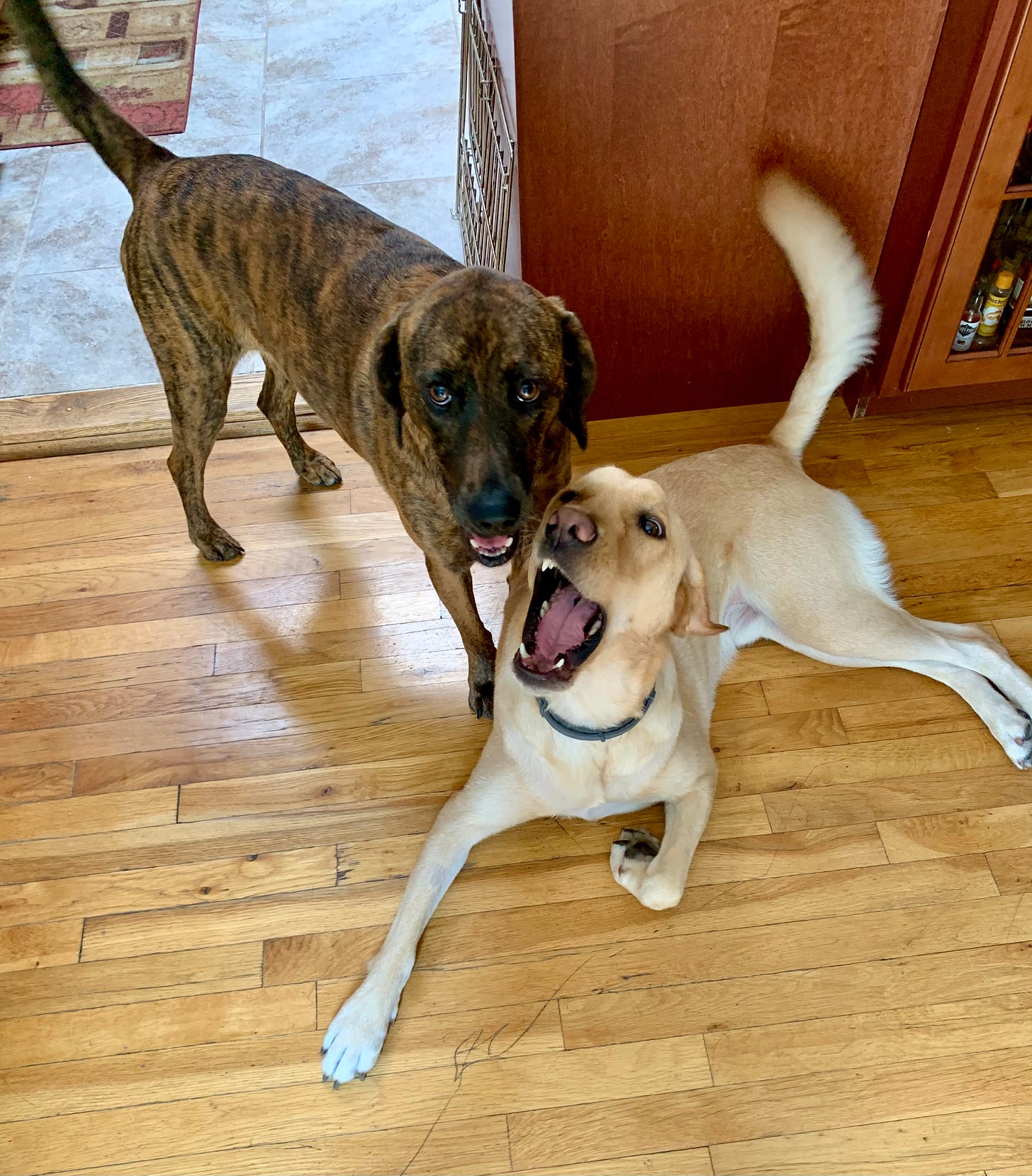10 Simple Steps to Improve Your Dog’s Mental Health (That Cost You Nothing)
These might work for owners too
Mental health issues are extremely prominent in dogs today.
Whether it be anxiety in their younger years or cognitive dysfunction (doggy dementia) in their senior years, most dogs will suffer from mental health issues at some point in their lives. When they arise, many owners jump to the idea of starting anxiety medications. One magic pill, please!
While medication is certainly necessary in some cases, you really shouldn’t put your dog on medication if you don’t have to.
Just like in humans, it can be difficult to get them off the drugs once you start. Luckily, there are a number of things you can do at home to improve your dog’s mental health, and unlike prescription meds, they’re all free of charge.
1. Make sure they’re getting enough exercise
In your busy day-to-day life, this is the one you probably struggle with the most. But just as it is for you, regular exercise is extremely important for your dog’s mental health. Being outside allows your dog the opportunity to exercise their natural instinctive behaviors, sniff — stimulating their olfactory bulb (smell center of the brain), and stimulates the release of endorphins, which reduce stress and anxiety.
2. Keep their routine consistent
Each day is different and that’s OK, but do your best to keep the bulk of their routine consistent. This will help provide them with a sense of security, reducing their stress and anxiety.
3. Try positive reinforcement training
You can hire a trainer or implement these principles on your own. Reward-based training (and I don’t mean treats!!) will help foster a secure and healthy bond between you and your dog. Positive reinforcement is also proven to reduce fear and anxiety in dogs.
4. Offer them a nutritionally balanced diet
Just as it is for you, a balanced nutritious diet is important for your dog’s cognitive function. A balanced diet rich in essential nutrients supports brain health, which will contribute to their overall mental wellbeing.
5. Pump some fish oil over their kibble
Omega-3 fatty acids, particularly EPA (eicosapentaenoic acid) and DHA (docosahexaenoic acid), are essential for brain health and will help prevent cognitive decline as your dog ages. Many commercial diets have some EPA and DHA in them already, but these nutrients tend to degrade quickly in the food and often aren’t present in high enough quantities.
6. Get them a puzzle for their birthday
Okay, this one isn’t free, but it shouldn’t cost you a fortune, either. Special feeders and puzzle toys are a great way to keep your dog busy and provide enrichment at home. These will also help to prevent cognitive decline as your dog ages.
7. Make sure they’re getting adequate sleep
If your dog is anything like mine, he probably doesn’t need any help with this one.
But a lack of quality sleep can definitely have negative mental health implications for your dog. The amount of sleep your dog needs may vary depending on age, breed, and other factors. As a general rule of thumb, puppies should sleep anywhere from 18-20 hours a day.
Adult dogs typically sleep 12 to 14 hours per day in total, with senior dogs perhaps sleeping a bit more.
What’s important to keep in mind here is that any abrupt changes in your dog's sleep pattern, increase or decrease, can be indicative of an underlying health issues. So, if you notice that your dog is suddenly sleeping more than usual, you’d better check in with your vet.
8. Don’t let them be antisocial
Positive social interactions play a key role in reducing anxiety in dogs, and socializing them regularly will help them to develop social skills and build confidence.
Recent studies have also shown that dogs with strong social connections (both canine and human) have better long-term health outcomes than their socially isolated counterparts. So sign them up for day care, send them out with the dog walker, take them to the park and let them play off-leash, and if they meet a dog that they like, make every effort to set them up regularly. Dogs need friends too.
9. Provide a safe and calm environment
Providing a calm and peaceful environment is paramount for your dog’s mental health.
Loud noises, yelling, or anxiety among human members of the family will all be stressful for your dog, so it’s important to make sure you’re taking care of yourself as well. Of course, it’s not going to be utopia in your home 100% of the time, so make sure your dog has a designated area that they can retreat to during stressful situations. This will help to give them a better sense of security.
10. Take them to the vet regularly
Okay, this one also isn’t free, but it’s extremely important!
Your dog should be examined by their vet AT LEAST once a year. Routine veterinary care is essential for both physical and mental well-being, and will help with early detection of any health issues. If your dog suffers from anxiety at the vet, consider establishing point of care with a vet that does house calls, or use digital veterinary services to reduce unnecessary trips to the vet.
As pet parents, it's our responsibility to prioritize our dog’s mental health as well as our own. By incorporating the above ten steps into your dog’s routine, you will build them a life that fosters happiness, reduces anxiety, prevents negative behavior, and improves their overall well-being.
Sometimes it really is that simple.
Dr. Sami





Such wonderful info!
I know several doggos with severe mental health issues
Do you suggest 1x/year check ups at the vet for cats as well?